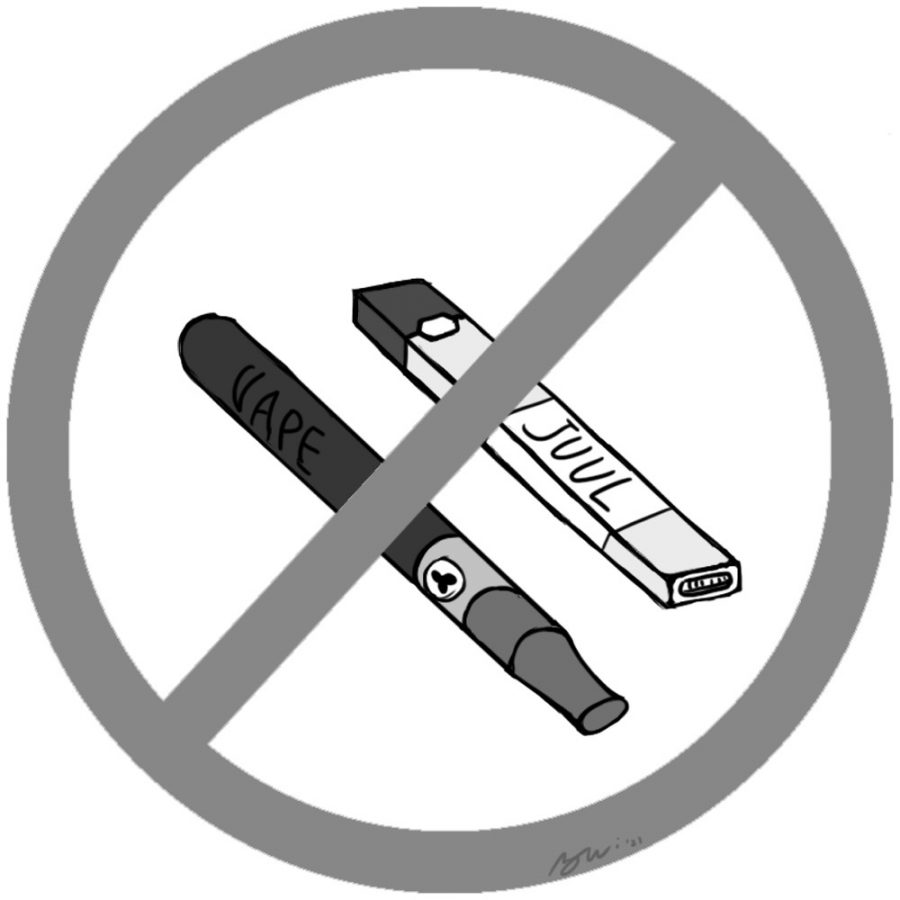Vaping: A New Policy for a New Phenomenon
Over the summer, Groton students received an email from dean of students Michael O’Donnell informing them of an updated vaping policy. The email stated that vaping would be considered a “violation of a major school rule,” which left many students questioning what exactly that meant.
In the past, the punishment for vaping was a tobacco warning, meaning students were issued a formal warning from the Dean’s Office. The warning would not appear on any records, and would only be followed up on if the Deans felt the student needed to seek help for addiction. With the new policy, the punishment for vaping is referral to the Disciplinary Committee, if the Deans and headmaster Temba Maqubela see fit, for recommendation of punishment, which Mr. Maqubela can choose whether or not to accept.
Part of the reason Groton implemented this change was to catch up with the policies of its peer schools. “We have taken an audit of the schools we work closely with, and every school has made a similar change over the past couple years,” said Mr. O’Donnell.
The school also wanted to take note of vaping devices’ increased prevalence on campus, especially because they could be used for drugs. Mr. O’Donnell said, “We haven’t made the vaping punishment more extreme than anything else – we simply decided to move it under the category of alcohol or drug use, rather than tobacco.” He explained that rolling papers or a glass pipe could very easily be used for other things, even if a student said it was used for tobacco. “Cartridges in e-cigarettes and other vaping devices can be used with THC [a chemical commonly found in marijuana],” he continued, “so we have to be mindful of that.”
The vaping trend is certainly booming across the country: the American Psychiatric Association reported that one in four high school sophomores and one in three seniors vaped in 2017. 10 percent of these students reported vaping nicotine, and 5 percent reported using a vape to ingest marijuana. The vast majority of vaping devices are used without one of these products. Vaping devices are no less addictive than traditional cigarettes, according to the National Center for Health Research. According to JUUL’s product website, one JUUL pod has roughly the same amount of nicotine as a pack of cigarettes. In addition, the effects of the vapor are still fairly unknown, but vaping’s immediate health effects include cardiopulmonary problems, such as shortness of breath or heart palpitations, according to University of Pittsburgh Medical Center.
Because it’s a major school violation, any student caught in the presence of a vaping device – whether they were using it or not – will be, at the very least, brought to the deans. This includes roommates: if a vaping device is found in a student’s room, even if it was not being used and was not theirs, they will be brought to talk to the deans. A student, who requested anonymity, complained that the updated policy “is collective punishment.” The school, however, takes a different stance. “We are trying to look out for the safety of all our students,” said Mr. O’Donnell, “It is highly unlikely that you don’t know what is happening in your room. If this is a problem for anyone, we hope that roommates can have open and honest communication about putting each other at risk.”
The student body holds different opinions toward the new policy. Some cite Massachusetts’ new law, which raises the legal tobacco age (including vaping devices) to 21, equating it with that of marijuana and alcohol, and say that the new policy makes sense. Others argue that the policy should remain the same, since 18 year olds that turned 18 before the law was changed can still purchase vaping products, or had already and are now dependent. “Many Groton students are still able to legally purchase these devices,” said one anonymous student source, “and the result of that is an increased
prevalence around campus. Students started [vaping] before the law was changed. This new rule will only make students less inclined to seek out help, or report someone they know is doing it.” While the new policy is intended to prevent further spread of the vaping trend, some of the student body is wary about how it may affect students that already vape.
Mr. O’Donnell and the Deans’ Office want to emphasize that any student seeking medical help for addiction can do so through the Counseling Office anonymously, and there are resources, such as nicotine patches, available through the Health Center. Only time will tell, however, if this policy will successfully decrease the amount of vaping on campus, or if it will only heighten stress among those who already do.












